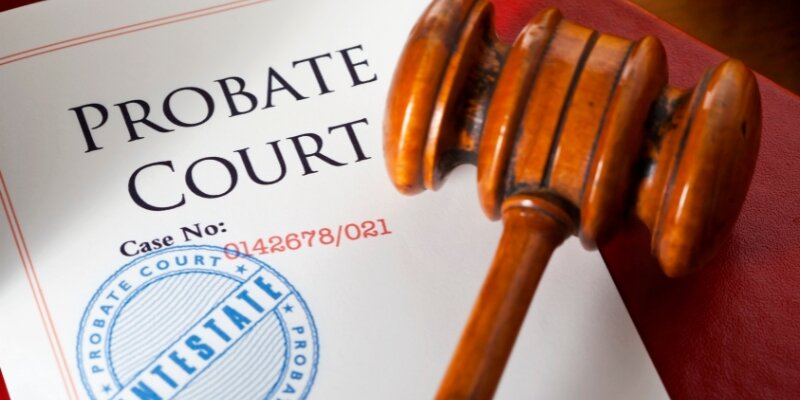
When a loved one passes away and leaves behind a property, it can raise many questions for the surviving family members. One of the most common queries is, “If a house is in probate, can it be sold?” The answer is yes, but the probate sales process can be complex and involves several steps. In this comprehensive guide, we will explore what happens to a house in probate and the steps involved in selling it.
In Today’s Article:
- What Happens to a House in Probate?
- Probate Laws: A Look at Texas
- Property Conveyance to Surviving Spouse, Children, or Next of Kin in Intestate Probate
- Probate FAQ
What Happens to a House in Probate?
When someone passes away and owns real property, such as a house, the property becomes part of their estate. The fate of the house in probate typically follows a specific process and set of legal procedures and can vary depending on the jurisdiction. Here, we will provide a general overview of what happens to a house in probate.
Step 1: Initiate the Probate Court Process
The first step in dealing with a house in probate is to initiate the probate court process. This involves filing a petition with the local probate court to open the estate. If the deceased left a will, the court will validate it during this process.
If the court determines that there is no valid will, the court will determine the legal heirs according to state laws.
Step 2: Hire a Probate Attorney and Petition to Start the Process
Navigating the probate process can be complex, and it’s highly advisable to hire a probate attorney to guide you through the legal requirements. The attorney will help you prepare the necessary documents and petition the court to start the probate process.
In 2024, changes in the housing market and increasing awareness of probate alternatives have encouraged more families to seek streamlined solutions when handling inherited properties. If you’re currently managing a property in probate or expect to soon, it’s important to stay updated on options that can reduce stress and speed up the sale. Whether you’re exploring a cash buyer route or preparing for a traditional sale after court approval, having access to professional support can make a big difference. See how we can help guide you through the probate sale journey with minimal delays and maximum clarity.
Step 3: Inventory and Appraisal
Once the probate process begins, the court will require an inventory and appraisal of the deceased individual’s remaining assets, including the house. This step ensures that the estate’s various financial and physical assets, are accurately assessed and accounted for.
Step 4: Contact a Real Estate Agent
If the deceased’s will specifies that the house should be sold, the executor of the estate or the appointed personal representative should contact a qualified real estate agent experienced in handling probate properties.
The realtor can provide valuable insights into the local market and help determine an appropriate listing price.
How Can the Executor Sell a House That Is in Probate?
Selling a house in probate typically requires the involvement of the executor, personal representative or person appointed by the court. Here are the steps involved in selling a house in probate:
Step 1: Obtain Court Approval
Before proceeding with the sale, the executor must obtain court approval. This often involves submitting a proposed sales agreement and seeking confirmation from the court that the sale is in the best interest of the estate and its beneficiaries.
Step 2: Market the Property
Once court approval is obtained and the house enters probate, the executor can work with the realtor to market the property on the open market. This includes listing the house, hosting open houses, and promoting the sale of real estate property to potential buyers.
Step 3: Accept an Offer
When a suitable offer is made, the executor can accept it on behalf of the other beneficiaries of the estate. However, the acceptance of the offer may still be subject to court confirmation in some jurisdictions.
Other Articles You Might Enjoy:
- How to Sell a Probate House in Texas in 2025
- How to Price Your Inherited Home in Houston: A Complete Guide
- Did You Inherit a House with a Mortgage? Learn Your Options
- Inheriting A Property in Texas: Laws, Probate & Options
- 5 Essential Steps to Sell Your Inherited Manufactured Home in Texas
Probate Laws: A Look at Texas

The probate process and laws governing the probate sale can indeed vary significantly from one state or jurisdiction to another. To provide a clearer perspective, let’s consider a specific example: Texas.
In Texas, the probate process may follow unique procedures and regulations compared to other states. While we’ll provide a simplified overview, it’s crucial to consult with a Texas probate attorney for precise guidance and proper filing. Here are some key points related to probate in Texas:
1. Independent vs. Dependent Administration: In Texas, the executor of the will can choose between independent and dependent administration. Independent administration typically allows for a more streamlined process, while dependent administration involves closer court supervision.
2. Homestead Exemption: Texas has strong homestead laws that protect the primary residence of the family member who deceased. This means that the other family members may be able to continue living in the house without it being sold to satisfy creditors.
3. Small Estate Affidavit: In Texas, if the estate’s value is below a certain threshold, it may qualify under state law for a simplified probate process known as a Small Estate Affidavit. This can expedite the distribution of assets, including real estate.
4. Muniment of Title: Texas offers a unique option called Muniment of Title, where the deceased’s will can be admitted to probate solely for the purpose of transferring title to property without the need for full probate administration.

Why Sell Your House To TX Cash Home Buyers?
1. You Pay Zero Fees
2. Close Quickly or the date of your choice
3. Guaranteed Offer
4. No repairs required, we buy as is
5. Less Hassles!
Call Now (281) 595-7550 Send Text
Property Conveyance to Surviving Spouse, Children, or Next of Kin in Intestate Probate
When someone passes away without a will, their property goes through the intestate probate process. In this case, state laws determine the distribution of assets, including the house, to surviving spouses, surviving children, or next of kin.
Selling the house may still be an option, but it typically requires court approval.
Transfer on Death Deed
In some jurisdictions, property owners have the option to use a Transfer on Death (TOD) deed to specify who will be the heirs to their property upon their death. This deed allows the property to transfer directly to the named beneficiary without going through probate.
If a house is designated with a TOD deed, it can be sold by the heirs or the beneficiary after the owner’s death.
Selling to A Cash Buyer
Another option for selling estate property while in probate is to consider selling it to a cash buyer. These investors who buy houses in probate may be willing to purchase the house as-is and cover the closing costs, which can be much quicker than the traditional home sale process.
The Bottom Line-If a house is in probate can it be sold?
Selling a house when it’s going through the probate courts can be quite a complex process. It involves dealing with legal rules, getting approval from the court, and often dealing with emotional challenges. It’s really important to have a probate law attorney on your side to help you through it.
Whether the sale is based on what’s in the deceased person’s will, what the court says, or how things work when there’s no will, understanding the steps you need to take and following the local laws in your area is key to successfully selling the house. So, having the right legal guidance is essential.
Probate FAQ
1. What happens when one sibling is living in an inherited property and refuses to sell?
When one sibling is living in an inherited property and does not wish to sell, it can create a complex situation. In such cases, the co-owners, including the sibling who wants to sell, may need to reach a consensus. If an agreement cannot be reached, legal action, such as a partition lawsuit, may be necessary to force the sale of the property.
This can be a lengthy and costly legal process, and it’s often recommended to seek legal advice to navigate these situations.
2. What are the disadvantages of probate?
The disadvantages of probate include:
- Time-Consuming: Probate proceedings can be lengthy, taking months or even years to complete, which can delay the distribution of assets to beneficiaries.
- Costly: Probate can be expensive, with fees including court costs, attorney fees, and executor fees, which can reduce the overall value of the estate.
- Lack of Privacy: Probate is a public process, and details of the estate, including assets and debts, become a matter of public record.
- Complexity: Probate can be legally complex, requiring adherence to specific rules and regulations, potentially leading to disputes among beneficiaries.
3. Does the executor have the final say?
The executor of an estate does not have the final say in all matters. The executor’s role is to carry out the deceased’s wishes as outlined in the will and manage the estate’s affairs. However, the executor’s actions are subject to court approval, especially in significant decisions such as selling property or distributing assets.
The court oversees the executor’s actions to ensure they are in compliance with the law and are in the best interests of the deceased person’s estate and its beneficiaries.
4. Which type of ownership would best avoid probate?
Several types of ownership can help with avoiding probate, including:
- Joint Tenancy with Right of Survivorship: When one owner of a property passes away, the ownership automatically transfers to the surviving joint tenant without the need for probate.
- Tenancy by the Entirety: This form of ownership is typically available to married couples and offers the same automatic transfer of ownership to the surviving spouse.
- Living Trust: You can set up a revocable living trust, which enables you to transfer ownership of your assets to the trust while you’re alive. When you pass away, the assets held within the trust can be smoothly distributed to your chosen beneficiaries without the need for probate proceedings.
- Beneficiary Designations: Assets like life insurance policies, retirement accounts, and bank accounts can have named beneficiaries. Upon the owner’s death, these assets pass directly to the designated beneficiaries, bypassing probate.
5. What happens if you live with someone and they pass away?
If you are living with someone, and they pass away, the legal implications can vary based on several factors:
- Marital Status: If you are married, your rights to the deceased’s assets may be protected by marital laws. However, if you are unmarried, the legal rights can differ significantly.
- Ownership: If you jointly own property, such as a house, with the deceased, the ownership may automatically transfer to you through survivorship rights.
- Wills and Estate Plans: If the deceased had a will or estate plan, it will dictate how their assets are distributed, and you may be named as a beneficiary.
- Intestate Succession: If there is no will or estate plan, intestate succession laws in your jurisdiction will determine how the deceased’s assets are distributed, which may or may not include you as a beneficiary.
Disclaimer:
The content provided on this blog is for informational purposes only. We are not attorneys or tax professionals. For personalized legal or tax advice, please consult with a qualified professional.
Written by Lisa Martinez, Founder of TX Cash Home Buyers

About The Company
TX Cash Home Buyers helps Texas homeowners sell quickly and simply — even in tough situations like repairs, inherited homes, or financial stress. Founded by Lisa Martinez, we’re known for our local experience, fair offers, and commitment to guiding sellers through off-market sales with clarity and care.





